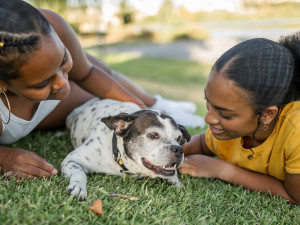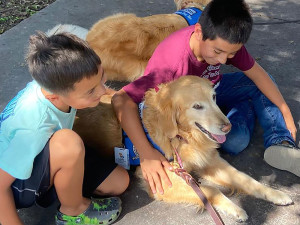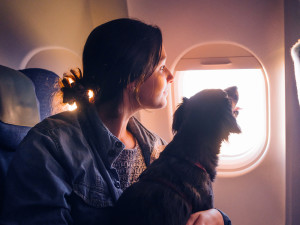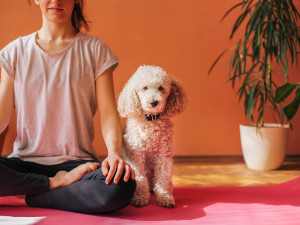Shockingly, Your Pet Will Enhance Your Mindfulness Practice
The next time they try to kiss your face while you’re in corpse pose, let them.
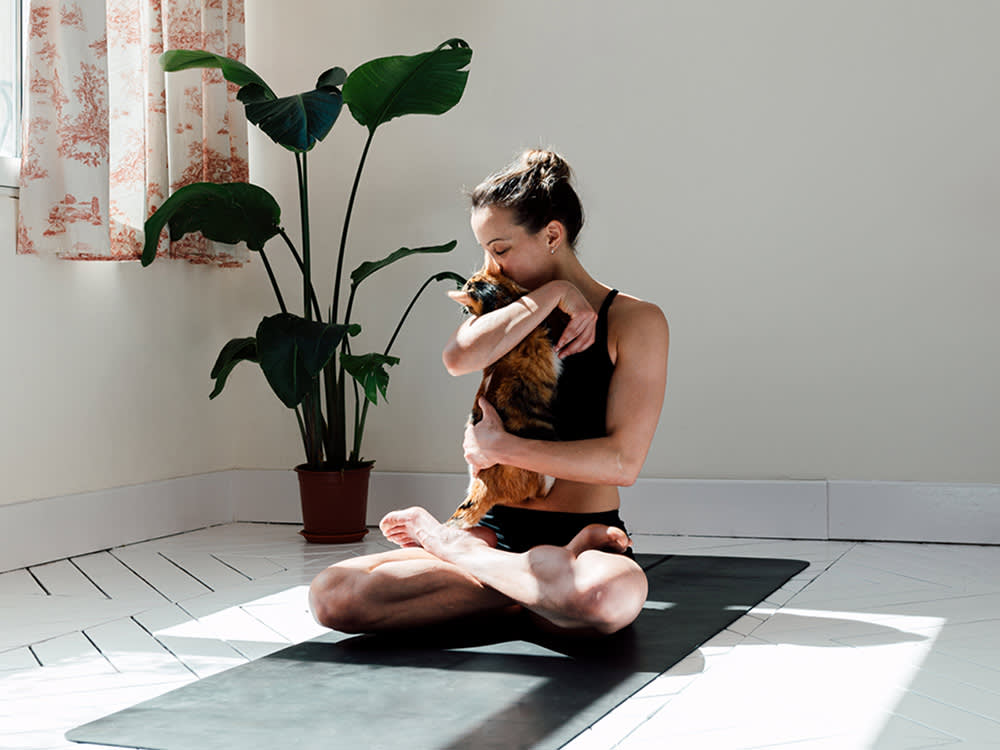
Share Article
There’s so much we can learn from our pets and how they approach life. While we may spend hours doom-scrolling through Instagram, wondering how our old college buddy can afford to seemingly be on perpetual vacation (hint: no student loans), they know how to live in the moment. From lounging on a sun-drenched floor to watching the outside world from the windowsill, they know how to focus on the things that really matter, and there is never a hint of FOMO passing through their mind. It’s not a stretch to say our animal companions might be experts in practicing mindfulness.
For the uninitiated, mindfulness is a form of meditation with roots in Buddhist philosophy. It involves honing in on our present thoughts, feelings, body, and surroundings, and experiencing them without judgment. There’s growing evidence that supports the potential for mindfulness to improve stress, anxietyopens in new tab, depression, mental health treatmentsopens in new tab, and even our attention spansopens in new tab, so there are plenty of reasons to give it a try.
If you struggle with sitting still, don’t worry. Mindfulness doesn’t have to mean sitting on the floor in silence, though you can absolutely do that if it’s your jam. Just don’t label yourself a failure if that method doesn’t work for you, and try not to cram yourself into a box. Boxes are great if you’re a cat, but every person is different. You can — and should — personalize your practice. Best of all, your pets can help.
Practicing Mindfulness with Your Pets
Whether they intend to or not, our animal companions aid in our self-improvement quest, whatever that may be, says Leanne Nieforth-Bomkamp, a PhD candidate in the Organization for Human-Animal Interaction Research and Educationopens in new tab at Purdue University.

“If you come home from a really bad day, and then your dog greets you at the door, tail wagging, super-excited to see you, you forget about all the terrible things that happened at work, and you’re just able to be present and joyful with your animal,” she says.
A mindful moment with your pets can happen anywhere. When you wake up, you could focus on the warmth of your cat resting on your body and the sound of their purrs. While you’re on a walk with your dog, you could take in the sight and sound of the trees swaying in the wind while you inhale and exhale.
Your regular practice could also be a one-minute “do nothing” practiceopens in new tab, which is actually recommended for people with attention deficit hyperactivity disorder (ADHD), or it could last for as long as 45 minutes. But, (and you can breathe a sigh of relief here) even a 12-minute session practiced five days a week can improve your attention span, according to neuroscientist Amishi Jhaopens in new tab. It’s also easy to include your pets in these moments.
Pet parents who have, or have attempted to have, an at-home exercise or mindfulness routine know that the animals of the house love to be part of what their human is doing. Your dog might shower you with kisses while you’re lying on your back on a yoga mat as your cat loafs on your chest.
Instead of discouraging these moments, let them happen. These moments — even the dog kisses — can all be part of the practice. Observe your dog’s playful demeanor and their disappointed huff when they realize that it’s not playtime. Scratch their favorite spot and pay attention to how petting your dog makes you feel. Watch the rise and fall of your cat’s body while they breathe. Take stock of your emotional response to your animal companion’s choice to spend their time with you, and you with them.
“Living with a sentient being that has thoughts, feelings, and emotions creates space for us to have these mindful interactions, and really understand how our body language and communication are influencing something else,” Nieforth-Bomkamp says.
The Human-Animal Connection
Anyone who has ever had an animal companion has an anecdote about how that animal has left a positive impact on their life. But, Nieforth-Bomkamp says, there’s also evidence, empirical data, and research to back up these claims on both psychological and physiological levels.
“Psychologically, people perceive pets as nonjudgmental, in terms of their ability to provide comfort and support,” Nieforth-Bomkamp says. We saw a lot of this during the COVID-19 pandemic, when more than 23 million American households adopted a pet, according to the American Society for the Prevention of Cruelty to Animalsopens in new tab.
“The traditional human interactions that people were used to having disappeared with social distancing, and often turned into a virtual setting,” Nieforth-Bomkamp adds. “So, people were turning to their pets for contact comfort, and the social support that they got from their pets was able to kind of stand-in for that human social support.”
Dogs can help lower our blood pressure, reduce our risk of heart disease, reduce loneliness, and provide structure to our daily schedules, to name just a few of the benefits of pup parenthood. It’s a mutually beneficial relationship: When we pet our dogs or gaze lovingly into their eyes, both of us get a boost of oxytocin, called “the love hormone.” Let’s not leave out cats, either — multipleopens in new tab studiesopens in new tab have foundopens in new tab that cat parents tend to be happier and less stressed.
Mindfulness meditation is mutually beneficial, too. “If you are sitting on the ground, doing your yoga or practicing mindfulness, there’s usually a moment where your energy changes or you know, something changes; your pet typically clues into that,” says Nieforth-Bomkamp. So if you’re practicing mindfulness, chances are that your dog will settle down and share that moment of peace with you. “That sense of nonjudgmental social support and being there for you, regardless of what's going on, really helps us out,” she says.
Getting Into the Routine
That being said, sticking to any routine takes self-discipline. It’s easy to hunch over our phones while adding to our growing meme collections and simultaneously guilting ourselves over doing nothing (to my oven: I’ll get to cleaning you one day). We cycle through productivity hacks, from the Pomodoro method to body-doubling to time blocking our calendars, or just working with a good old-fashioned to-do list.
We’re definitely not alone in this struggle. Multiple aspects of modern life have dulled our ability to focusopens in new tab for longer periods of time. We put ourselves down for not sticking to our over-aspirational routines, try and try again, and the vicious cycle lives on. Pets can help us stay on track.
“Pets have a way of instilling routine in our lives and creating a sense of purpose and caring for another being,” Nieforth-Bomkamp says. Think back to how your dog wakes you up for walks, or how your cat stares you down in anticipation of dinner at five p.m. on the dot.
We’re all so busy these days, from work in the traditional sense to cooking, cleaning, and everything else that comes with running a household. On top of that, it’s important to claim time to tend to our personal routines and also maintain our relationships with our friends, family, and pets. Even if you’re not struggling with your executive function, those are a lot of responsibilities for any individual. That’s why trying mindfulness, and sharing it with your pets, can be worth it — remember, as much as 12 minutes a day can make a difference.

Kat L. Smith
Kat L. Smith is a writer and editor based in Queens, New York. They have written for LIVEKINDLY about a wide range of topics related to sustainability, lifestyle, house plant care, and food. They share their apartment with their adopted dog, Layla, and Vivi, a one-eared cat.
Related articles
![Poodle sitting next to the girl while having home yoga class]()
So You Want to Try Doga?
Nope, that’s not a typo — dog yoga can improve the mental well-being of people and their pets. They don’t call it downward dog for nothing!
![Dave looks down at his dog Stanley, with the sea and rock cliffs in the background.]()
5 Dog-Friendly Nature Spots around LA for Hiking, Camping & Zenning Out
LA wellness guru Dave Coastopens in new tab shares his favorite places to escape the city with his Poodle.
![Dog sitting in a tent surrounded by candles and crystals]()
Alternative Therapies Can Zen Out Your Pet, Too
Wellness treatments like acupuncture, Reiki, and sound baths are helping pets heal and bond with their parents.
![Woman laying on tan couch beneath large windows showing trees and sunshine with her dog laying beneath her]()
How Alison Wu’s Dog Is a Positive Force for Her Mental Health
The lifestyle blogger and creative director’s Spaniel helps her stay grounded:
“When life gets inevitably turbulent, Tilly offers me much-needed stability, support, and calm.”![Dog licking its paw inside by the fire.]()
Hot Spots in Dogs: What Are They, How to Treat Them, and How They Compare to Ringworm
From home treatments to holistic methods—and when to call a vet.
